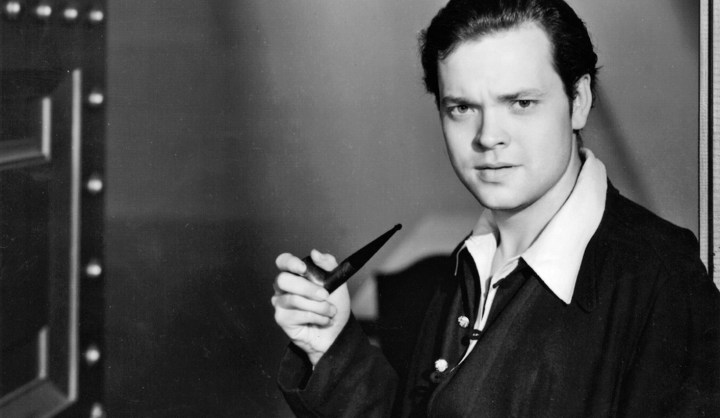Maverick Life
Orson Welles, 20th century’s true genius

With the hundredth anniversary of Orson Welles’ birth comes news that his final unfinished film may yet be done – three decades after he passed away. J. BROOKS SPECTOR looks back at Welles’ astonishing impact on his chosen craft.
The hundredth anniversary of the birth of Orson Welles, the ultimate entertainment polymath, was last week on 6 May 1915. And now comes news of plans to finish his final, as yet uncompleted film, The Other Side of the Wind, with the aid of a budget raised by crowd sourcing. Welles, of course, is well remembered for his involvement with a whole cluster of some of the most important films in cinema history, an astonishing high wire project on radio – as well as an unmistakable, deeply resonant speaking voice. Towards the end of his life, hard up for cash to complete his newest projects, he put those pipes on hire for indifferent film voiceover work and television commercials flogging frozen food and so-so wines. Welles died in 1985, a bloated shadow of his former glorious self.
Some of his greatest works include Citizen Kane (which he directed, largely wrote and starred in), The Third Man, The Lady from Shanghai and The Magnificent Ambersons; a radio broadcast that frightened half of America into believing imaginary Martians had landed in New Jersey, just outside New York City and were bent on taking over the world; and in creating a modern fascist Italian setting for a 1937 production of Julius Caesar that remains the longest-running production of that classic, ever, on Broadway, among many other projects. Welles is also known and remembered for his gargantuan appetites, his struggles to finish so many of his works, his famous feuds with the movie studio moguls (among others) who controlled the money, the soundstages and the stars for his films – and even his excursions into productions of intense but bizarre films such as that unique setting of Macbeth, a product that defies easy explanation.
For most cinema people, the name Orson Welles immediately invites comment on his 1941 film, Citizen Kane, a vast, sprawling work that chronicled the life of publisher Charles Foster Kane, a cinematic roman a clef presumably based on the life of the very real media titan, William Randolph Hearst. Completed when Welles was just 26 years old (what were you, oh gentle reader, doing when you were 26?), the film portrays Kane’s life from his time as a small boy in the West from a poor family, on through his early crusading newspaper days and then on to his growing, brooding isolation after his two marriages fail, his professional reputation suffers, and his publishing empire spirals downward during the Great Depression.
Watch: Citizen Kane (1941) – Original Trailer
The film, characterised by cinematic devices now well-known and frequently used by many other directors, but largely premiered in and developed by Welles for Citizen Kane, remains enigmatic for many over the single word uttered at the end of Kane’s life (and the beginning of the film), “Rosebud”. Was it the name on the child’s sled the young Kane had left behind or did it mean something else, much deeper, more significant and imbued with great foreboding? In his film, Welles created a work that takes place both in the past and present – as obituary writers try to take the full measure of this protagonist. And as storytelling, it takes place across a vast canvas that has meant the American Film Institute has given it the nod as its pick as the greatest film – ever made.
And remember, Orson Welles – just 26 when it was released and still younger while it was made – convincingly played Kane from his time as an idealistic young man on to his final circumstances as a tired, bitter old man, virtually locked away in his castle in California. As seen in the film, Kane’s castle, Xanadu, is shown as a pile of stone that bore a startling resemblance to Hearst’s actual San Simeon mansion. And naturally, controversy followed Kane from this film, as publisher William Randolph Hearst was rather less than happy over that uncanny resemblance between Kane and himself, thereby keeping the lawyers busy as a result.
Kane always fought the studio system. His next hoped-for masterstroke, The Magnificent Ambersons, made the year after Citizen Kane, was finally taken out of his control and released in a cut-down, butchered version that was rejected by most audiences and disliked by critics. But even in the truncated version, it represented a stunning morality tale of the decline of an old-line family unable to respond to the vast changes in American economic life over the several generations of family members.
Even before Citizen Kane, however, Welles had burst onto the national consciousness with his live dramatisation on radio of HG Wells’ classic science fiction novel, War of the Worlds. Broadcast on Halloween eve 1938, as part of his and actor John Houseman’s “Mercury Theatre on the Air” programmes on the CBS radio network, Welles had transferred the storyline of War of the Worlds from the London area to a New Jersey town near to New York City, thereby scaring the life out of half a continent with a show that delivered faux actualities as breathless flash news bulletins, inserted into a programme of light popular music. Although the programme announced at the beginning that it was a fictional dramatisation, many listeners apparently tuned in after the disclaimer and thought they were listening to the real deal.
Watch: George Orson Welles apologizes for the The War of the Worlds broadcast (October 31 1938)
While the actual extent of the national panic the broadcast generated has grown in size and magnitude with each retelling over the years, it remains clear Welles and his colleagues had figured out how to deliver absolutely riveting theatricality in reporting “news”. Re-listening to this broadcast even now, one is struck by how it presaged the way 24-hour news cable and satellite TV channels and social media now inundate with an unstinting din of alarming news titbits. In achieving its effect, Welles’ War of the Worlds also uncannily channelled a growing national jitteriness about the increasing instability in Europe and East Asia as Germany, Italy and Japan were already embarking on actions of territorial conquest, pre-World War II. The resulting national panic meant Welles had to offer a contrite apology the following day, and he and CBS faced a bevy of threatened lawsuits over the psychological damages the programme had presumably caused. The furore stemming from this broadcast continues to be a mainstay of sociology and psychology studies as a perfect textbook example of how to generate mass hysteria – and how it can become a self-sustaining hurricane. (You can hear the entire broadcast here.)
Over the years, numerous films and theatrical ventures followed Citizen Kane and The Magnificent Ambersons, but many were commercial failures (as were these two films, as well). However, in the 1949 film, The Third Man, Welles was superbly cast as the central figure in a film the British Film Institute has blessed with its number one. (Most of its US counterparts list Citizen Kane as the best movie of all time, sometimes switching places in top three with Casablanca and Gone with the Wind.) Portraying the murdered Harry Lime, the morally anomalous, contraband medicine smuggler operating in Allied-occupied Vienna immediately after World War II, Welles perfectly conveyed the moral ambivalences of that environment. Carol Reed masterfully directed the film and he directed it from a screenplay co-authored by Reed, Welles and novelist Graham Greene (who later took the screenplay and turned it into his own wonderfully evocative novel).
Watch: The Third Man – Orson Welles’ Great Cuckoo Clock Speech
Over the years, Welles planned or began a growing number of films but these projects were never completed, usually for lack of funds. The most famous of these, the last work Welles had directed, The Other Side of the Wind, is now the subject of a widely publicised crowd-sourcing effort to raise the funds needed to finish the project, years after Welles passed away before finishing its editing and post-production. According to the new crowd-sourcing website launched to raise the funds needed to complete the project, the film, sometimes described as the greatest film never finished, is the story of a film director determined to make a comeback – something that seems rather like Welles’ own life.
As this website explains, “The origin for the story dates back to a brawl between Ernest Hemingway and Welles in 1937, during the recording of Orson’s narration for a Spanish Civil War documentary. Inspired by the interaction, Orson began to craft a story of an author in decline. As the years passed, the character would change from an author to a filmmaker.
“Originally self-financed, Welles later turned to a mixture of financiers (German, Spanish and Iranian) to complete the film. Things turned for the worse when a producer absconded funds and the Persian revolution complicated the Iranian investors involvement. Orson came to an eventual impasse with the Paris-based, Iranian investor. During that time potential resolutions came and went, and new financiers came and went, but Orson was never given the chance to fulfil his own vision of the film.
“Taking admittedly mediocre acting jobs in film, television and in commercials to help finance his attempts to finish the film, Orson would spend the very last years of his life battling to regain full control of The Other Side of the Wind. After his passing, three decades of legal feuds ensued, until 2014, when the rights issues were finally resolved by Producers Filip Jan Rymsza, Frank Marshall and Jens Koethner Kaul.” This as-yet-unfinished film has (or perhaps the words should be “will feature”) an extraordinary cast that includes John Huston, Dennis Hopper, Peter Bogdanovich, Lilli Palmer and Oja Kodar.
Anton Karas – The Third Man Theme
Over the years, Welles appeared in a growing roster of mediocre films, like the Yugoslavian socialist-era WWII mega-spectacle Battle of Neretva, voiceover projects, as well as those television commercials hawking everything from frozen peas in a handy plastic pouch to some decidedly mediocre California wines. For the latter, the winemaker’s copy promised the makers “will sell no wine before its time,” and were delivered by Welles with his magnificent voice and flawless timing, even if the taste buds told a slightly different story about this beverage. Such efforts paid the daily bills and they helped sustain his hopes that his last project might yet be completed. Nonetheless, efforts like those TV commercials must have represented a painful comedown for Welles from his glory days of filmmaking with the likes of RKO Studios, even if the studio bosses and their bookkeepers were constantly baying at Welles’ heels over costs.
While his film presence in Citizen Kane produced many memorable lines and he is well-remembered for putdowns and snap judgements about other stars and the industry he worked in, for this author, when the name Orson Welles comes up, it seems inevitable that his most famous line in The Third Man – delivered with Welles’ perfect insouciance and distain – is the one that comes to mind first. Welles, as Harry Lime, says to a friend in the film, “In Italy for 30 years under the Borgias they had warfare, terror, murder and bloodshed, but they produced Michelangelo, Leonardo da Vinci and the Renaissance. In Switzerland they had brotherly love – they had 500 years of democracy and peace, and what did that produce? The cuckoo clock.” Welles was certainly never about brotherly love either, but he produced masterpieces in every art form he touched. DM


















 Become an Insider
Become an Insider